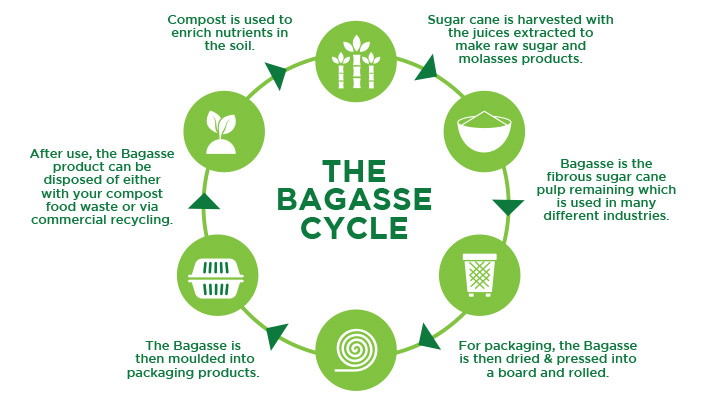Newsletter

Message regarding biodegradability and compostabillity of packaging imported and marketed by EDEN Eco Products Ltd.
PACKAGING A HOT TOPIC: TOO MUCH, FAR TOO MUCH PACKAGING IS USED ENDING UP IN THE LANDFILL. EVEN THE BIODEGRADABLE ITEMS ARE PART OF THIS. WE NEED TO LOOK AT ALTERNATIVES
Items in stock are made from bagasse material like sugarcane fibre, cornstarch, other starches or bio-plastic. Any of these materials needs a micro-life environment for decomposing. Bagasse and paper take just a couple of months to decompose, starch material up to 16 months and bio-plastic even up to three years. Besides the cornstarch film as a liner for paper cups, another natural coating is the food safe, non-toxic, compostable plant-based carnauba wax to line say a wooden spoon. No problem with these, this material goes as it enters the compost.
Bio-plastic bags are available in New Zealand since year 2009, a stronger material than cornstarch. Though not suitable for home composting. Commercial recyclers will shorten the long composting periods by shredding and heating.
EDEN Eco Products Ltd offer fully biodegradable packaging. Sourced from natural ingredients, and as such, accepted by ‘Mother Earth’ for recycling. The PLA pellets from corn products, lactic acid fermented from plant sugars, have been tested on GMO (genetically modified organisms) and showed a negative result. Raw material for cups supplied globally by NatureWorks LLC, www.natureworksllc.com. The popular starch bags are made from 100% biodegradable starch resins. Resins manufactured in Europe, Composting certified by A/B Vinicotte International in Belgium.
For the (edible) cornstarch resin raw material, there is now also the oil derived bioplastic, 100% biodegradable. Compostable plastic is plastic capable of biological decomposition, as such breaking down to biomass, carbon dioxide and water, not leaving any residues. Ample info about biodegradable packaging going to search engine Google entering the words PLA, Mater-Bi, Natureworks LLC, cornstarch, biodegradable plastics and the Standards as mentioned below.
Compostable Standards are set by American Society for Testing Materials (ASTM, www.astm.com) European Standardization Committee (CEN) and International Standards Organization (ISO). Commonly registered certificate numbers are ASTM6400, ISO 14855 and EN13432. Bowls and containers, also the bags are food graded for storage of food.
Please note that any biodegradable material, whether cornstarch, sugarcane fibre, bioplastic fibre, palm fibre or grass fibre, none can be recycled together with “real” plastics. Commercial recyclers know how to deal with this. If the recyclers don’t want the alternative material, the landfill is the option where the alternative material will decompose due time, not leaving any residue. Home compostable material still can take some extra cycles than standard kitchen waste.
Standard rule, REFUSE any artificial material, REDUCE any artificial material as much as possible including clothing and artificial fabric shopping bags, and REUSE. Good quality material will last instead of buying single-use products.
Another verbal support and effective when implemented to reduce the environmental footprint: Refuse, Reuse, Repurpose, Repair and Recycle.
Most natural packaging will decompose in the natural environment, whether by moisture or microlife in the soil/compost. Bioplastic material is made from PE (plastic) resin pellets and biodegradable pellets, made from natural plant fibres like bamboo, corn, depending on what crops are harvested during different times of the year. The plastic and plant fibre pellets are mixed at the factory. This mixture is then fed into the hopper of the bag machines, where they are melted at very high temperatures. This causes the plant fibre pallets and plastic pellets to be mixed and fused together from which the bags are blown into a tube. A roller will flatten the material, after that printing with biodegradable ink and lastly material will be cut to the required shape and size.
General information: The first letter of the order code number indicates the material where it’s made off. If the code number on the bag starts with the letter S, the material is cornstarch. Letter G it is bioplastic. Additionally, If the code number shows the letter H, then the material takes temperatures up to 80 degrees Celsius.
Please contact the office for any query at: edengreenpaknz@gmail.com